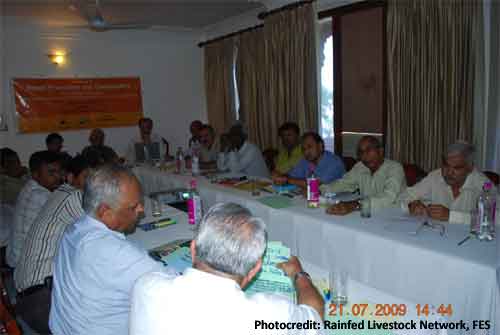National Workshop on ‘Breed Promotion and conservation in rainfed areas’
Aug 11, 2009
A “National Workshop on Breed Promotion and conservation” was organized by the Rainfed Livestock network, anchored by the Foundation for Ecological Security (FES) and hosted by Lokhit Pashu-Palak Sansthan (LPPS), a core group member of the Network from 20-21 July 2009 in Sadri Rajasthan.
The prime objective of the workshop was to share experiences and knowledge for strengthening the promotion and conservation of local breeds which are valued by livestock keepers for their multiple uses. The thrust was to develop a strategy for bridging the gap between the breed conservation by the livestock keepers (traditional breeding systems) and development programmes being run by the government. The existing efforts of NGOs towards breed strengthening through the establishment of breeders associations and development of niche-markets were also shared.
The floor was well represented by Government Institutions, Research agencies and NGOs. Concerns were raised on protecting the diverse genetic base of the various breeds specific to a particular area. This would allow conservation of genes in their respective breeding tracts and ensure the presence of particular breed suitable for that eco-system and agro climatic conditions. Participants shared that cross-breeding with exotic breeds in the resource and market poor areas have not been successful. Initiated on account of quick economic gains, cross-breeding failed due to the lack of support in feed and fodder resources in addition to adaptability to the climatic conditions.
 The participants were in agreement that the potential of Goats has been least explored despite their special relevance in the Indian economy since they are reared by resource poor people. It was discussed that there is an ambiguity in the policies for goat development. Emphasis in the discussion was on identification of breed lines amongst indigenous breeds that give optimal production to be taken up for breed improvement which can sustain in the given resource base.
The participants were in agreement that the potential of Goats has been least explored despite their special relevance in the Indian economy since they are reared by resource poor people. It was discussed that there is an ambiguity in the policies for goat development. Emphasis in the discussion was on identification of breed lines amongst indigenous breeds that give optimal production to be taken up for breed improvement which can sustain in the given resource base.
The workshop provided an opportunity to revisit the earlier policies adopted and action taken for breed propagation and conservation. Some of the important concerns raised during the workshop were:
• Taking stock of the market forces by which the livestock keepers are likely to be governed and designing the policy recommendations accordingly.
• Giving due weightage to organizations providing composite health services to case of small ruminants.
• Appropriate importance be given to pasture / common property resources development in view of anticipated high population growth rates in case of small ruminants and dependence of goat rearers on CPRs.
• Focus on in-situ (community based) conservation and promotion approaches rather than ex-situ conservation (controlled environmental conditions). For example Pinjrapoles and Gaushals can be developed as conservation and breed improvement centres.
On the basis of the discussions at the workshop, a number of policy issues were agreed upon to be followed by various stakeholders. These were designing livestock breeding policy based on the agro-ecological zones and livestock production systems; integrating conservation and genetic improvement programmes; setting up a central monitoring unit for data recording/analyzing of breeds; introducing herd registration schemes specifically for arid and semi arid areas; developing/strengthening institutions (breeders/livestock keepers societies), who determine the agenda/policy/programmes for livestock development and management etc.
Contributed by - BAIF, India









